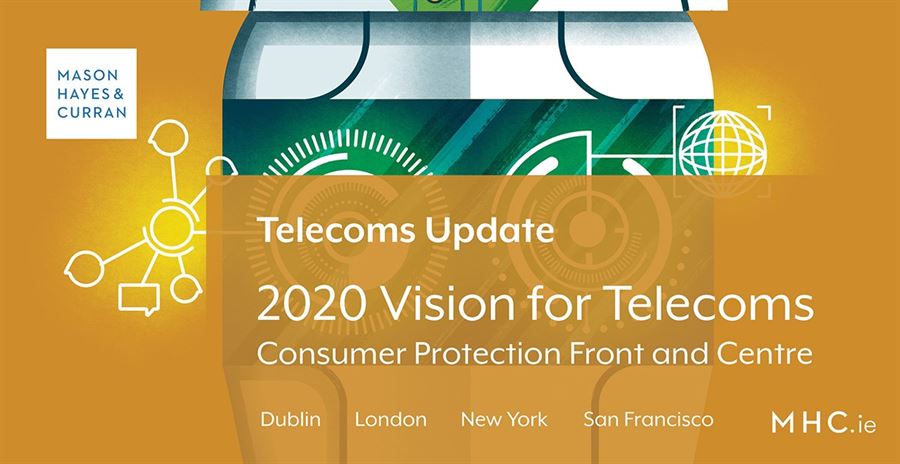
Late 2019 and the beginning of 2020 was an eventful period for Irish telecoms operators with a number of legal developments in the area of telecoms customer information requirements. Customer rights, and specifically, information requirements, are squarely in the Irish telecoms spotlight.
In mid-December 2019:
-
Six Irish telecoms operators, namely Virgin Media, Three, Digiweb, Imagine, Vodafone and Pure Telecom, were issued with Notifications of Findings of Non-Compliance by ComReg for breaches of customer information requirements under existing Irish electronic communications rules (the Open Access Regulations). Those breaches related to failures to provide certain required information to customers, for example, regarding the estimated maximum and advertised download and upload speeds for mobile internet services. These operators had until 30 January 2020 to respond to ComReg to state their case. No further information has been published at this time (28 February 2020.
-
Meteor, trading as GoMo, was issued with a Direction by ComReg regarding a breach of customer information requirements under existing Irish electronic communications rules (Universal Services and Users’ Rights Regulations). This case related to a failure to provide a phone number as a first point of contact for complaints.
-
The European Commission published an implementing Regulation (2019/2243) specifying the format of certain mandatory advance contract summary information to be given by telecoms operators to customers under new consumer information rules. These rules will be introduced across the EU by December 2020 as part of the implementation of the EU Electronic Communications Code.
Further, in February 2020, Virgin Media was also issued with a Notification of Finding of Non-Compliance by ComReg for breaches of customer information requirements under existing Irish electronic communications rules (Universal Services and Users’ Rights Regulations). This case related to a failure to provide customers with all of the information required by the rules regarding their entitlements to withdraw from their contract without penalty in response to a contract change notification. Virgin Media has until 23 February 2020 to state its views.
2020 will see new important rules in this area under Ireland’s implementation of the EU Electronic Communications Code. The detailed nature of new customer information rules to be introduced in late 2020 will no doubt mean that the IT systems and customer on-boarding processes of many of Irish telecoms operators will need be updated this year to address these requirements.
Telecoms rule changes in 2020 – enhanced regulation
Much of the existing Irish telecoms legal framework adopted in 2011, which supplemented the underlying Communications Regulation Acts 2002 to 2017, will be replaced from the end of 2020 by Ireland’s implementation of the new EU Electronic Communications Code (the Code). Ireland is required to transpose the new Code by 21 December 2020 and work is underway in the Department of Communications, Climate Action and Environment to facilitate its implementation.
The new rules will address how, over the course of the next decade, operators interact with end users buying their phone, internet and associated services, for example through bundled multiplay offerings. In addition to expanding regulatory oversight to new types of telecoms offerings from non-conventional over the top platforms such as WhatsApp and Skype, the new rules will pave the way for the next generation of networks using 5G. In doing so, the vision is that the legal rules will be ready for the expected explosion of future service offerings unlocked by 5G and the Internet of Things, including in areas such as driverless cars and intelligent connected machines.
What will the Code address?
The Code is a substantive piece of codifying legislation and covers various key areas in electronic communications such as planning and co-ordination of scarce radio spectrum, the general authorisation framework, network access and security, numbering and universal services.
A significant aspect of the new Code is the ongoing strengthening of information and other rights for telecoms consumers. Information and transparency rights are already contained in existing legislation. These provisions include the rules under the Open Access Regulations and Universal Services and Users Rights Regulations regarding upfront information that customers must receive about their phone, mobile or internet service before they are bound by a contract. These existing rules will be updated and fine-tuned under the Code once implemented.
Some new aspects of note
Two new aspects under the Code stand out:
Mandatory contract summaries
Providers of publicly available electronic communications services, including fixed line and mobile operators, must provide certain minimum information to consumers in a clear and comprehensible manner before they are bound by a contract. This includes information such as the identity of the seller, the price of the services, the duration of the contract and how to terminate. This builds on existing requirements in this area.
What is new is that the Code requires that consumers be given a contract summary by their telecoms operator in a prescribed form. In mid-December 2019, the European Commission published Implementing Regulation 2019/2243 which sets out a mandatory template for how information is to be provided – including prescriptive rules on font size, presentation and length of the contract summary that must be given by relevant telecoms operators to consumers.
Mandating conformity in how these information requirements are presented in a contract summary is intended to ensure consumers are equipped with clear information that will enable them to shop around for the best telecoms deals and to understand and compare the terms offered to them. This new form will need to be adopted by telecoms operators in their customer sales and on-boarding processes.
New rules regarding bundles
New rules governing bundled offerings will also apply. Telecoms bundles are common in the Irish market. ComReg’s latest Quarterly Report (Q3, 2019) estimates that over fifty percent of customers purchase bundled telecoms services through some form of dual, triple and quad-play offerings. Virgin Media and eir, for example, have quad-play offerings across landline, mobile, broadband and television services.
The new rules provide that when a bundle of services, or a bundle of services and terminal equipment such as a handset, contain at least an (i) internet access service such as fixed broadband or (ii) a number based communications service, such as fixed landline or mobile phone services, then various consumer rights under the Code will apply to all aspects of the bundle. This is true even in instances where those other aspects of the bundle would otherwise not be subject to consumer rights under the Code. This has broad application and could extend the reach of the important consumer rights provisions of the Code to services not regulated by it.
By way of example, the rules under the Code requiring that certain information be provided to consumers in the form of a contract summary in a prescribed form will now apply to all aspects of the services offered under a defined bundle. Importantly, the Code will also extend a consumer’s right of termination for certain contract breaches to a right to terminate all aspects of the bundle – even in the absence of any breach for those other bundled aspects.
Cross-sector bundles
Interestingly – and more relevant for the future rather than the existing Irish market – where a telecoms service is bundled with a non-telecoms service, the rules under the Code will have a cross-sector reach. This may apply, for example, where telecoms services are bundled with financial services like handset financing or insurance, energy or travel services. While cross-sector bundled offerings are limited in Ireland at present (e.g. Panda Waste’s electricity, gas and waste collection services), this may be a development to watch in Ireland the future. In the UK, for example, the Utility Warehouse offers bundled phone, broadband and energy services.
The reach of the new consumer rights under the Code could see ComReg regulating compliance with these rules in non-telecoms sectors – requiring even greater interaction with regulators on a cross-sector basis, e.g. with the Commission for Regulation of Utilities and the Central Bank etc. This was recently recognised by the Council of European Energy Regulations in their November 2019 paper “Guide on Bundled Products” and is an interesting area to watch – particularly for those in the utilities sectors.
Conclusion
Very little stays still in telecoms and change is on the way again in 2020. While operators will likely have until the end of 2020 before the new rules are in force in Ireland, they will need to plan ahead now to ensure their systems are ready for the new rule changes under the Code.
For more information on the likely impact of the Code, contact a member of our Media & Telecoms or Technology teams.
The content of this article is provided for information purposes only and does not constitute legal or other advice.







